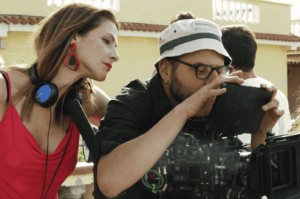Exploring the Vision Behind “Good Vibes”: An Interview with Filmmaker Janet

Filmmaker Janet’s latest project, Good Vibes, offers a compelling critique of the digital age’s impact on privacy and personal well-being. In a recent interview, Janet delves into the inspiration, creative process, and challenges faced while bringing the film to life. Co-written with Mirko Virgili and Ersilia Cacace, Good Vibes highlights the pressing issue of technology abuse and its effects on society. Janet’s reflections provide a deep insight into her journey and the message behind her work.
The initial inspiration for “Good Vibes”? – Personal experiences which influenced the film’s creation
Janet, who collaborated with Mirko Virgili and Ersilia Cacace on Good Vibes, shares that the inspiration for the film stemmed from her extensive experience as the director of the Digital Media Fest since 2012. Janet says, “Through this experience, I have seen firsthand how new technologies can be exciting and allow the emergence of young authors who use new languages, but at the same time, I have witnessed the addiction of young people to audiovisual content that is swallowed up.” Janet observed how young people, engrossed in hours of poor-quality audiovisual content, became victims of cyberbullying and how the excessive use of mobile phones led to a diminished appreciation for information. “I have seen families destroyed by the control of the content of emails or messages on social media, but the key element that led me to make the film was the birth of my daughter” stated Janet. Janet wanted to address the urgent need to safeguard privacy and tackle the pitfalls of technological dependence, delivering her message with a strong and unfiltered approach.
The approach behind “Good Vibes” – Overcoming Challenges

The creation of Good Vibes was no small feat. “The writing lasted three years and four drafts. We evaluated many aspects of the messages we wanted to give, but in the end, we found keys that satisfied us.” The team meticulously evaluated various aspects of the messages they wanted to convey. The production phase, however, was fraught with challenges. Janet stated that securing funding from the Ministry of Culture and the Calabria Film Commission was a significant achievement, but the production faced numerous obstacles. Janet says, “The production had many difficulties in following the project, and what helped in its realisation was certainly the great team of extraordinary people who believed in me and in the project, and the wonderful actors starting from Vincent Riotta, Caterina Murino, Ludovico Fremont, Nicola Pecci, Leonardo Santini, Andrea De Rosa, Alessandro Onotrati, and all the others.”
The Secret behind the film’s outstanding visual style
Janet, with her background in architecture, approaches film as an art form deeply rooted in visual aesthetics. Her appreciation for colour and design is evident in Good Vibes. Talking about her inspirations, she says “From a visual point of view, I really love the Italian director Sorrentino (a Master of the image), and I have always been fascinated by the narration of Tarantino and Nolan.” Janet also acknowledges the contributions of young set designer Andrea Rullo and director of photography Federico Torres. Rullo’s initial reservations about the project were overcome through Janet’s persuasive vision, leading to meticulous attention to detail in the film’s aesthetics. Torres, chosen just a month before filming, brought a unique style that complemented Janet’s artistic direction, despite the personal loss of the film’s original director of photography, Blasco Giurato. Janet exclaims, “With Federico, we prepared the film (scene by scene) through internet calls (10 hours a day), and we met only a week before filming…Real madness.”
Audiences’ response to “Good Vibes”
The reception of Good Vibes has been overwhelmingly positive. Janet reveals, “The audience really appreciated the film. We held many evenings during festival events to check the reaction and ask for feedback. We are really happy. The reactions that struck me the most were those of middle school and high school teachers who asked us to be able to hold screenings in schools.” This feedback highlights the film’s impact and its relevance to younger audiences, reflecting the effectiveness of its message.
Key lessons learned which can help aspiring filmmakers
Janet’s advice to aspiring filmmakers emphasises the importance of post-production and promotion, often the most challenging phases of filmmaking. She says that they can “give life to the project”. She further states, “For this reason, it is essential to choose the right production that shows that it truly believes and loves the project, to be able to make it grow just like a child.” Her experience underscores that making a film is just the beginning; nurturing and promoting it to ensure it reaches its full potential is where the real work lies.

Janet’s upcoming projects – How long do we need to wait?
Janet reveals that “”Among the many things I do, I also work as a creative director for many companies: so, right now, I’m working on social campaigns like COMIECO’s, for which I made a podcast, a video clip, and a song dedicated to paper and cardboard recycling.” Additionally, she is preparing to launch a children’s channel, magichappyness.com, aimed at raising awareness among young audiences about important social issues. On the cinematic front, Janet is developing a family fantasy film that will explore themes of family and life, although details are still in the early stages.
The role film festivals play in supporting independent filmmakers

According to Janet, film festivals are crucial to the global film industry. She says, “They are fundamental. Without these festivals, there would be no outlet for some works and some directors. Thanks to many film festivals, a magnifying glass is put on works that then find the right interlocutors to fully enter the film industry. These are therefore very important realities that act as a bridge between the creative and cultural world and that of industry, sometimes even with the world of institutions”.
Advice for other filmmakers
Janet advises filmmakers to cultivate their unique style and have something meaningful to convey, even if it goes against conventional norms. She states some valuable words: “”I believe it is essential to find your own style, but above all to have something important to say, something strong in your heart, even when it is contrary to the common vision. Culture and therefore also cinema have the task of breaking the mould, of creating reflections and even controversy (if necessary). Thanks to cinema, we can avoid (or worsen) homologation and provoke strong feelings by stimulating empathy.” She believes that cinema should challenge the status quo, provoke thought, and evoke strong emotions. By focusing on significant and universal themes, filmmakers can make a lasting impact and contribute to the broader cultural conversation.
Janet’s insights into Good Vibes reveal the depth of her commitment to addressing pressing social issues through film. Her reflections on the creative process and the broader role of film festivals offer valuable lessons for both aspiring and established filmmakers. As she continues to push boundaries and explore new projects, Janet’s work remains a powerful testament to the art of storytelling and its potential to inspire change.



